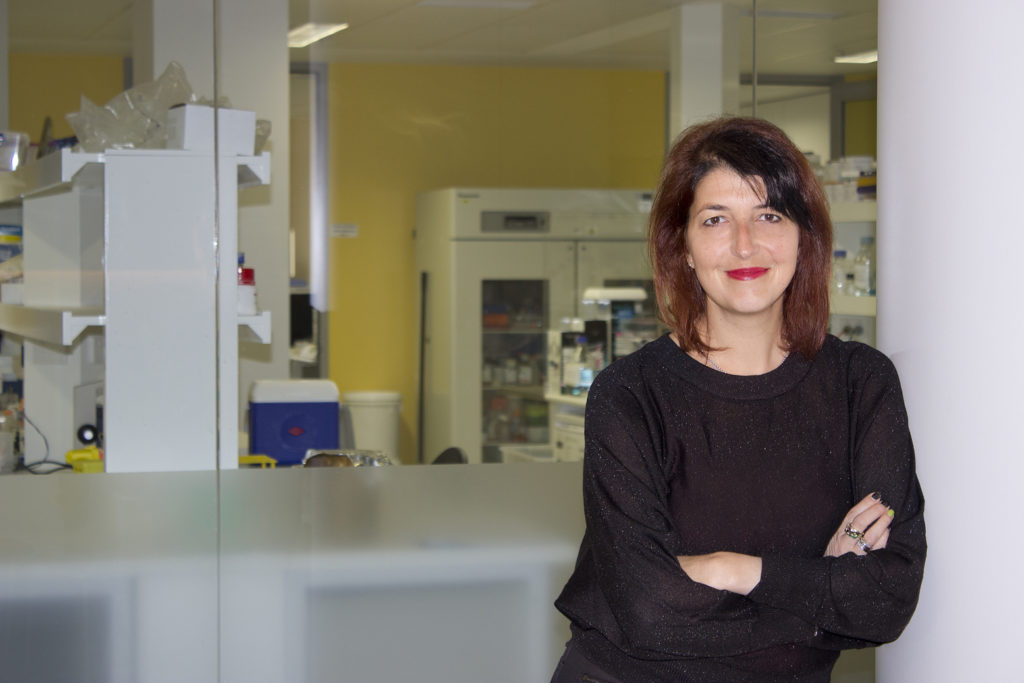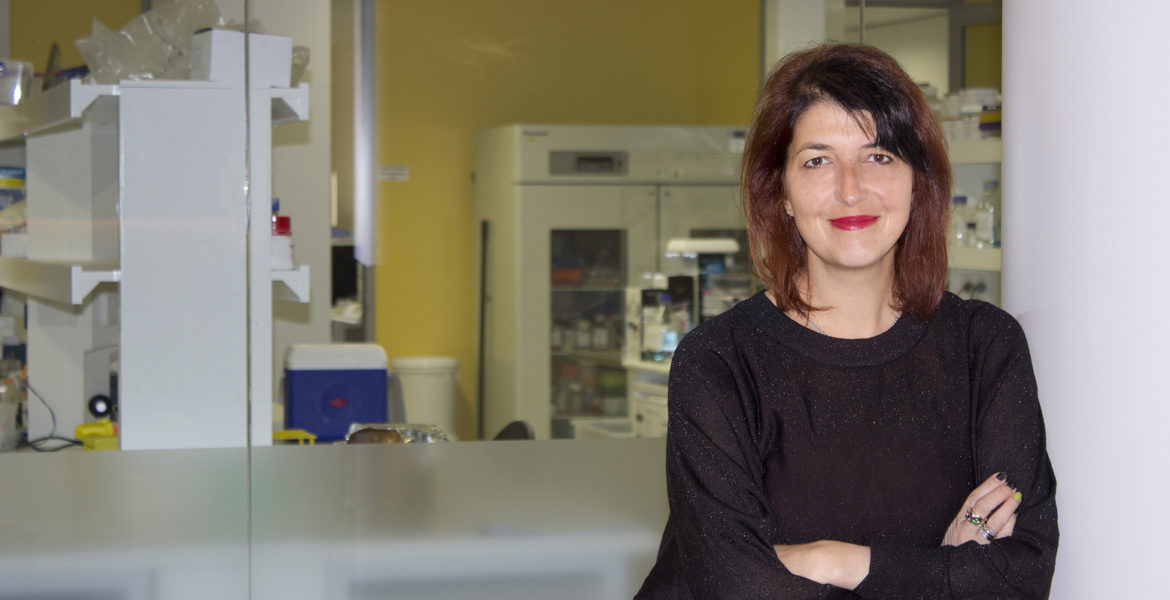
In a stellar example of excelling in your chosen field, Greek Australian Professor Patsie Polly has achieved incredible results in medical research and is nationally and internationally recognised as an education innovator. In a process that has been likened to a city bidding for the Olympics, she was recently promoted to full professor of Medical Sciences and Pathology in the Faculty of Medicine at the University of New South Wales, a tremendous achievement, as professor titles are notoriously difficult to gain.
Not only are these accolades thoroughly deserved for the years of passion and labour she has poured into her love for science, but they are also amazing achievements to fulfill by a working mother of two who is under the age of 50.
An international leader in developing virtual laboratories (vLABs) as teaching resources to enhance the student experience, Professor Polly produced the first vLAB in the Faculty of Medicine, UNSW to teach Western Blotting and protein expression changes that influence disease. This was the first of its kind internationally.
Her clear record of achievement as an educator in higher education has led to eight learning and teaching awards at the school, faculty, university and national level. She has attracted nationally competitive funding and published in her research areas.
Leading the Cancer Cachexia Mechanisms Research Group within Inflammation and Infection Research Centre since 2007, she has niche expertise in gene regulatory mechanisms, underlying muscle wasting due to cancer cachexia and has developed gene and proteomic approaches for identifying biomarkers in muscle wasting. She is also nationally and internationally recognised for molecular mechanisms of transcription factor-mediated gene regulation.
An inspiration to students and peers alike, you would be hard pressed to find a better role model for women. Not only does Professor Polly's promotion serve as the ultimate motivation for women to pursue their life's dreams, but it also pays tribute to the collective Greek upbringing of first and second generation Greek Australian children who were told that with hard work and strong efforts, they could achieve everything in the ‘lucky country.’
GCT had the fortune of nabbing some time with the Sydney born and bred Professor Polly, whose parents hail from Kalamata and Limnos, to discuss her passion for medical science and education, her achievements and how she has balanced her career with raising a family.
When was the first time you visited Greece and what impression did it make on you?
I went to Greece when I was 22 years old. I was backpacking with two of my friends from university. It was like a strange sort of homecoming. Although Athens and the islands were not familiar to me, the people were, especially family members even though I had only met them for the first time on this trip. The language was familiar, and it was effortless to be there. I felt like I was home.
What made you decide to study medical research and ultimately choose a career in teaching university students in addition to your research?
I had an excellent biology teacher at high school. I was inspired to study science and UNSW was my first choice. After completing my three-year undergraduate degree program, I was interested in lab-work. I approached a Cancer Research lab in what was then the School of Pathology, Faculty of Medicine, UNSW.
I was accepted as an Honours student in 1991 and after that year of intensive training in cancer research and molecular biology, I was introduced to the world of medical research. My interest in medical research intensified. From that point on a Ph.D. at the Garvan Institute of Medical Research followed, then a post-doctoral position as an Alexander von Humboldt Fellow in Germany (1997-1999), followed by a post-doctoral position as an NHMRC Howard Florey Fellow at the Children’s Medical Research Institute, Westmead (2000-2004).
At this point, my interest in higher education and student supervision started. I took an Academic position in the Department of Pathology, School of Medical Sciences at UNSW from 2004 onwards. I’ve been convening and teaching undergraduate courses in Pathology and within the School of Medical Sciences in addition to and supervising honours and higher degree research students since then.
Tell us about your research into cancer cachexia and gene regulation.
Cancer cachexia occurs in 50-80% of cancer patients and involves severe muscle wasting. It is directly responsible for 30% of all cancer mortality. At present, there is no means of early diagnosis or effective therapy.
My medical research has revealed molecular markers for how skeletal and cardiac muscle changes and ultimately breaks down due to inflammation and cancer.
Tell us about developing gene and proteomic approaches for biomarkers in muscle wastage?
My research has revealed gene and proteomic molecular biomarker ‘roadmaps’ to inform the cancer cachexia field on what molecules to target for investigating ways to fight muscle wasting due to cancer.
Do you believe a cure for cancers is near?
We are getting there in some areas of cancer research. It all depends on the type of cancer and the patient response to therapies.
What influences you in your work?
My interest in innovation and making a change. Asking and researching interesting questions and pursuing the unknown.
What motivates you?
Excellence, making a difference in society and enabling others to do the same.
How did you feel when you were recently promoted to Professor at UNSW?
A mix of strong feelings I didn’t expect. Predominantly, emotional and relieved….naturally happy and satisfied that I had achieved my goal.
In what ways do you think your Greek upbringing has influenced your work ethic and drive to follow your dreams?
There is a very strong work ethic in our family with the idea that if you can’t do a good job to completion don’t even attempt to start. Interestingly, I was left to follow my own dreams by my parents and husband…I was always supported by my family to do what I thought I needed to do to realise these dreams. My kids were quietly cheering for me and gave me space as I prepared for my promotion interview to full professor.
What has been the biggest highlight in your career so far?
Being promoted to full professor. Obtaining a Vice Chancellor’s Teaching for Excellence award for Innovations that Enhance Learning my students’ graduation ceremony. What a moment!
What has been your biggest challenge?
Obtaining funding to keep my medical research moving forward to stay ahead of competitors.
Finding time to exercise.
Which accolade or title has had the most significance for you?
Early career - being selected as Alexander von Humboldt Fellow – as recognition by my international colleagues for being an emerging medical research scholar.
Recent career- Scientia Education Fellow – as recognition by my peers and
Senior Fellow of the Higher Education Academy UK – as recognition by my international colleagues.
How have you managed to have a successful career, be a leader in your field and have a family at the same time?
With family support and a lot of juggling, passion, and energy! My husband and I are a great team!
What is your ultimate goal in your research and as an educator?
Medical Research- To reverse muscle wasting due to cancer.
Higher Education Research and Innovation- To enable professional skills awareness in undergraduates so that they can become ready for any future career they wish to pursue.
What is one piece of advice that has stayed with you along the way?
‘Trust nothing’ and ‘Get over disappointing grant outcomes quickly.’
What advice do you give to your students?
Choose something you like doing and doing your best will be effortless.


